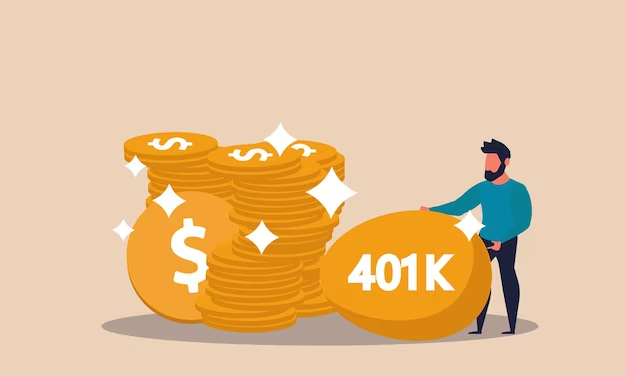In an ever-evolving financial landscape, diversifying one’s retirement savings is a strategic move that many consider. One such way is by transitioning from a 401k to a Gold Individual Retirement Account (IRA). This process, known as a rollover, can add a layer of diversification to your retirement portfolio. However, it’s crucial to understand the nuances and intricacies involved in such a decision.
Understanding Gold IRA
Gold has been a trusted wealth preserver for centuries. Today, this age-old practice takes the form of a self-directed Gold IRA. Unlike traditional IRAs, which house an array of financial assets like stocks and bonds, Gold IRAs contain gold or other approved precious metals.
Key Features of a Gold IRA
A Gold IRA enables you to invest in physical gold or other approved precious metals (like silver, platinum, and palladium) in a tax-advantaged account. This offers unique benefits, especially for those seeking a safety net against potential economic downturns and inflation. Essentially, when you invest in a Gold IRA, you’re buying physical bars or coins of gold, not gold stocks or mutual funds.
Pros and Cons of Gold IRA
Investing in a Gold IRA comes with its set of advantages and disadvantages. On the upside, it can serve as a hedge against economic downturns and inflation. Conversely, the storage of physical gold might lead to higher storage and insurance costs compared to a conventional IRA. This is because your physical gold investment will be housed by a custodian in an insured depository, thereby increasing ongoing costs. Whether it’s the right investment decision depends on your unique financial circumstances.
The Process of Rollover from 401k to Gold
Rollover from a 401k to a Gold IRA involves transferring funds from your existing 401k to a new Gold IRA. This process can either be direct, where funds are transferred directly from your 401k to your Gold IRA, or indirect, where you withdraw the funds from your 401k and deposit them into your Gold IRA within a crucial timeframe of 60 days to avoid tax penalties.
Potential Benefits of a Rollover
This diversification method offers potential benefits. Firstly, it brings diversity to your retirement portfolio, helping to mitigate risk. Secondly, gold is often viewed as a hedge against inflation and currency depreciation, providing a protective layer for your retirement savings.
Considerations for a Rollover
However, several considerations need attention. These include possible fees associated with the rollover, the risk due to fluctuating gold prices, and the comparatively low liquidity of physical gold than financial assets.
Direct Rollover vs. Indirect Rollover
The two types of rollovers—direct and indirect—have their unique characteristics and potential suitability.
Direct Rollover
Direct rollovers involve a direct fund transfer from your 401k to your Gold IRA. This method is frequently preferred due to fewer paperwork requirements and the elimination of the tax penalty risk associated with indirect rollovers.
Indirect Rollover
On the other hand, indirect rollovers involve temporarily accessing your funds by withdrawing them from your 401k and depositing them into your Gold IRA within 60 days. Although this method provides short-term access to your funds, it includes the imminent risk of missing the 60-day window, leading to tax penalties.
Transitioning Your 401k to Gold in 4 Steps
The process of transitioning money from your 401k into a Gold IRA investment depends on several factors. However, this transition generally involves four key steps:
- Choose a Gold IRA Company: Seek companies with a strong reputation, a transparent fee structure, and responsive customer service.
- Set Up Your Gold IRA Account: Complete an application with the chosen Gold IRA company and decide the funding source of your initial investment.
- Initiate a Rollover: Notify your 401k plan administrator about your intent to roll over funds to a Gold IRA. They will guide you through the necessary steps and paperwork.
- Buy Gold: Once the funds are in your Gold IRA, instruct your Gold IRA company to purchase gold or other approved metals on your behalf.
Tax Implications of a Gold IRA
Gold IRAs also adhere to specific tax rules. Contributions may be tax-deductible, based on your income and whether or not you or your spouse are covered by a workplace retirement plan. The earnings and growth accrue tax-deferred until withdrawal, meaning you don’t pay taxes on the gains until you start taking distributions in retirement.
However, early withdrawal (before age 59 ½) may imply a 10% penalty in addition to applicable taxes. On the flipside, potential liquidity issues can make it more challenging to take required minimum distributions (RMDs) once you reach age 73, which may also result in tax penalties. Due to the complex nature of tax laws, it’s wise to consult a tax professional before proceeding.
Cautions About Self-Directed IRAs
There are two main cautions when dealing with self-directed IRAs, including Gold IRAs. This industry has occasionally been plagued by fraud and bad actors attempting to exploit unsuspecting investors. Secondly, these types of IRAs come with extra rules that can be difficult to navigate. If you get it wrong, your IRA could be dissolved by the IRS and instantly become fully taxable.
Conclusion
Transitioning your 401k to a Gold IRA can be a strategic diversification move for your retirement savings while offering a hedge against economic uncertainty. However, it calls for understanding the inherent risks and costs. Remember, while this guide provides comprehensive information, it doesn’t substitute professional financial advice in making decisions around retirement savings. Always bear in mind that all investments pose risks, including the potential loss of principal. Plus, all investment decisions should align with your personal financial goals and risk tolerance.
Tips for Investing
If you’re contemplating investing or rolling over your investment account into other investments, you might want the assistance of a financial advisor. These professionals can help set up your investments to help you achieve your long-term financial goals.
If you’re uncertain about whether you should roll over your 401k or not, consider using a free 401k calculator to understand how certain factors will impact your overall investment.




